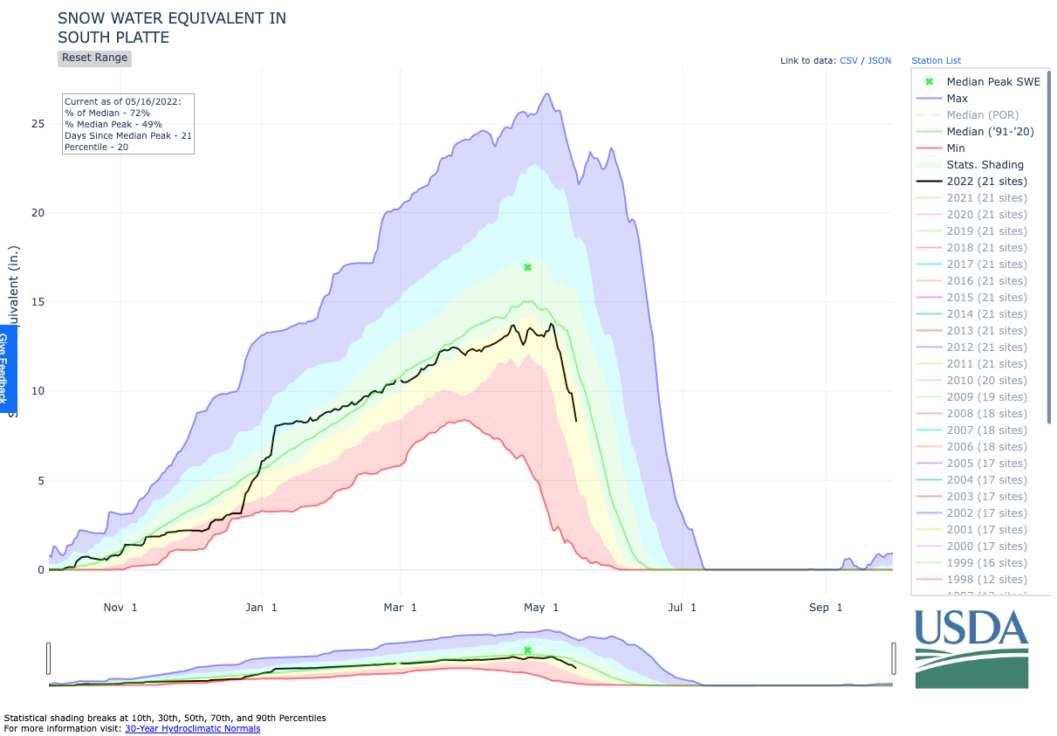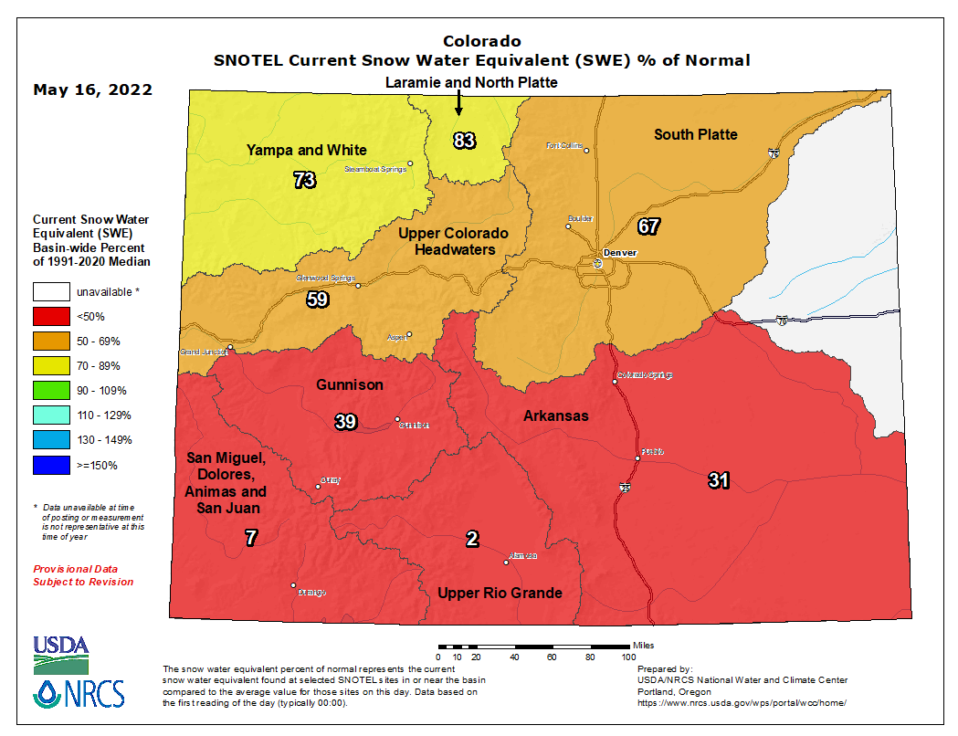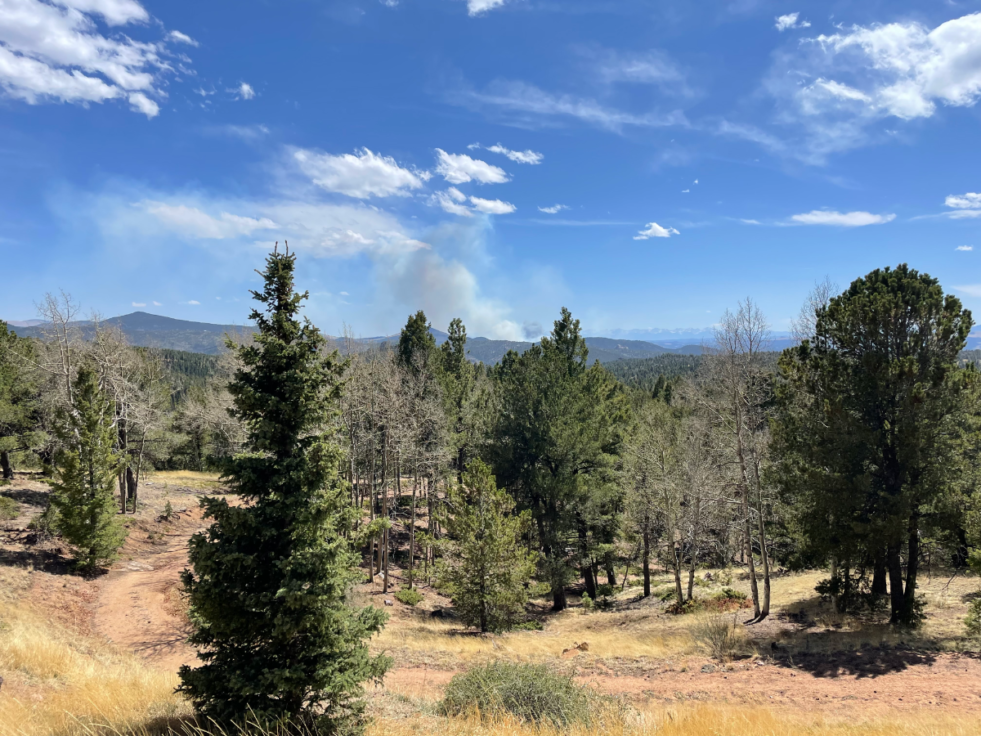The American west is bracing for what many predict to be an unprecedented fire season. Here in Colorado’s Front Range, we were hopeful as things were looking good through January and February. Then the precipitation shut off through our two snowiest months, March, and April. As of this writing, we are at 67% of our normal snow water equivalent for this time of year, with things looking even worse in the southern part of our state. To make matters worse, what snowpack we had has melted faster than we’ve ever seen before. The situation is indeed dire.


This past weekend, I hosted our annual Endure Trails Runs at Mueller State Park in Divide, CO. The week leading up to the event saw Red Flag warnings every day, with a fire eventually sparking up about 9 miles south southwest of the race site. The fire, known as The High Park Fire, in Teller County Colorado was sparked just west of historic Cripple Creek. It’s not the first time that a wildfire has burned less than 10 miles from a race site at HPRS, and I’m sure that it won’t be our last.
On Friday morning of race weekend, the fire was 400 acres in size with 0% containment. I started receiving several emails and text messages from runners and volunteers, all wondering if I knew about the fire. The last thing I truly want to have to monitor and potentially deal with as a race director, is a wildfire. Yet as I’ve mentioned countless times before, on my podcast and in writing, my number one job as an RD is Risk Management. The job of race director has less to do with hanging ribbons, putting awards around your neck, and saying “Go,” than it does with the identification and management of risk. Yes, I knew about the fire.

I am not a wild land fire fighter, nor am I a wildfire scientist; though I do have a healthy amount of meteorological knowledge, and over the years I have practiced and gotten proficient in weather forecasting, wildfire behavior, resource management and understanding the hydrology (snow and water) of the areas in which our races take place. I also rely on the many relationships I have built with our land managers over the years. Where I lack specific knowledge, I have acquired proficiency in other ways. All this to say that while I am no expert, I possess the skillset to make sound judgements for the health and safety of our runners.
It seems like every year is a trying year out west when it comes to snow, lack of snow, and wildfires. Here in Colorado, our skies are typically blanketed for months by smoke from fires burning everywhere but here. When fires do spark up in our state, the smoke is obviously thicker, more toxic, and less conducive to our having an environment to exercise in due to the fires locality. Last year, Denver was listed as having one of the worst air qualities on the planet. A few times we were ranked #1 in the world for most polluted air, even beating out Beijing.
Wildfire and smoke are commonplace in the west. This year may seem different, and more extreme. Races in New Mexico have already been cancelled, weeks in advance, due to huge fires raging in the state’s northern forests. Many of you may remember Gorge Waterfalls being cancelled in 2017 due to wildfires that scorched the Washington state course. It was years before the event would make its return, and by then under new ownership. This to say that out west wildfire is an RDs worst nightmare, as it has the potential to significantly impact a race and/or series for many years should the unthinkable occur. All this pales in comparison to the affects these fires have on our communities, and our neighbors. When you consider the substantial loss these fires unleash, running is trivial.
So as the fire burned just 9 miles from our race this weekend, I had already been at work monitoring the situation before anyone ever sent an email or text message. I was pouring over weather forecasts, searching for any update I could find from local authorities, communicating with our State Park hosts, and looking at the type and number of fuels this fire had in front of it. While I was able to determine that we could host our event safely, and with minimal affects from smoke associated with the fire, we still operated in stand-by with our Emergency Action Plan (EAP). I emailed all our runners and volunteers so that they knew that I was indeed aware of the fire, what my thoughts were, and what our plan was. My intent was not to alarm anyone, or to scare anyone away. My intent was to lead, communicate, and offer transparency.
The lead ranger of the state park checked in with us, in person, on Saturday morning. We discussed the fire burning to the south and agreed that based on the forecast and current conditions that we had no reason for alarm at that time. We discussed what would occur if the fire’s local pre-evacuation notice had moved further north and into the park. We discussed closing the red loop if that is indeed what occurred, keeping runners closer in to the park and out of that area. We discussed our evacuation plan, and we discussed our commitment to immediate communication should conditions demand. Our community was valued, cared for, and in good hands.
Naturally, several runners and volunteers opted to stay home this weekend. These are decisions that I do not pass judgement on. I am reminded of one of our mottos at HPRS, “Run or Don’t.” We each will have to make some difficult individual choices this year when it comes to running in environments where wildfire is not too far away, or where the skies offer an opportunity like smoking a pack of cigarettes while running an ultra. Just as I respect the runner’s choice to join us or not, I expect that everyone will also respect our decisions to proceed or not. These decisions are not easy and are based on all available information that is not taken lightly or flippantly.
When Covid hit, we had a decision to make. That decision was to shut everything down, hide in our homes, and forget about running; or to get to work by moving in that one direction we all know, FORWARD. Forward requires us to make a plan and put it into action. It was our plan and ability to communicate with all of our stakeholders, and the strength of those relationships, that allowed HPRS to operate through the pandemic and become the only major race series on the planet without a single cancellation.
This year will be no different. We can look at the situation at hand and say, “Welp… so much for running. It’s going to be too damn smokey. A fire that is closer to the race than the distance I’m going to run is just too close for comfort,” or we can once again recognize that a solid plan will allow us to move forward safely. Keeping in mind, that no race director can ever guarantee your safety, but we can in fact manage the risks and make informed decisions.
This weekend’s fire would ultimately grow to 1300 acres by race’s end, with only 10% containment. The pre-evacuation area crept to within 4 miles of our course. During the event we could see the intermittent plumes of smoke, we watched as helicopters and C130s flew overhead to fight the fire with air drops of water and fire retardant. The forecast held as predicted, and winds prevented the fire from burning in our direction, nor did the associated smoke engulf us. We held a successful event, without alarm, and safely made it home without anyone being injured or affected by the blaze. This was the best-case scenario.
Make no mistake; should the forecast had been different, if the fire had progressed in our direction, if the winds engulfed us in thick smoke… we would have acted very differently. We would have considered postponement or cancellation of the event. We could have greatly altered the event by eliminating the longer distances and focusing on us enjoying a shorter run. While we were fortunate this weekend, we recognize that next time we may not be as lucky.
Our “normal” this year in the Mountain West, is going to contain fire and smoke. We’re not going to cancel everything or run away. We’re going to make smart decisions that allow us to serve our community, while not at all affecting local EMS whose focus needs to be on their community. We will not do anything that could hurt the towns we recreate in, tax their local infrastructure so that focus is taken away from fire, or create a situation for our runners where help may not arrive because they have “other fires” to put out.
Looking at what could be unprecedented times this year, I feel it is necessary for us to publish our plan with regards to wildfire and smoke:
The Human Potential Running Series (HPRS) provides adventurers with an opportunity to discover their potential as humans. We recognize that our number one priority is the management of risks associated with the hosting of our events. While we can never guarantee your safety, we can communicate how we plan to manage risks. We also remain committed to our mission to “Build Respect Locally” by producing events that respect local residents, businesses, and local and federal land management agencies.
Our “No-Refunds Under Any Circumstances” policy will remain in full affect. If Covid taught us anything, it’s that “No Refunds” very literally means “No Refunds.” Please remember that all who complete registration for an HPRS event agree to the following terms:
WEATHER, ACTS OF GOD, TERRORISM/PANDEMIC RELATED REFUNDS & CREDITS:
In the event a race is cancelled due to extreme weather, fire, pandemic, terrorist threat/activity, or some other unforeseeable event, we cannot offer refunds or credits. ANY race can be cancelled, postponed, or ended early by the Race Director, emergency medical personnel, or any of our associated land manager(s). Those decisions will be made based on an in depth risk management assessment conducted by the race director, emergency medical personnel, and/or land manager(s), and with the overall safety of all involved (runners, pacers, crews, spectators, volunteers, etc), and land resource management, in mind. We understand these difficult decisions may not be the most popular with all involved, but the decision will be made with the proper risk management considerations in mind. Please understand that this is a risk we all assume in hosting, and/or participating in, these types of athletic events.
We will make every effort necessary to care for and about our community of runners. This includes the potential for altered credit policies to take care of our runners, while also protecting the future preservation of our events. A lot of this will depend on how close to race day an event is cancelled.
Should a situation arise where HPRS must make the difficult decision to cancel an event due to wildfire near our event site(s), we will communicate that decision as soon as possible to our registrants and volunteers so that other monies tied up in travel and lodging may be recouped.
We recognize, and ask that you recognize as well, that we do not always have weeks or many days advanced notice of wildfire. That a situation may arise where an event must be cancelled in the hours leading up to the event. That a situation may arise where an event must be cancelled during the event. In these situations, we are bound by our commitment to safety and risk management and bound by the direction of all local authorities and land managers. We ask you for your attention, cooperation, understanding, and patience.
We will make every effort to host all our events, so long as the situation and conditions afford us an opportunity to do safely. We will not purposely put our runners, spectators, crews, or volunteers in a situation that is life threatening, or potentially traumatic. There may be instances where a race may resume so long as considerable changes to the route and format are made. We may also attempt to reschedule an event. We will make those decisions on a case-by-case basis and is one of the many questions we will answer when determining an appropriate plan of action.
We will communicate our thoughts, positions, and plans in a thorough, timely and understandable fashion.
We cannot control air quality. While we recognize that hazardous air quality is not ideal for exercise and has potentially harmful effects to our health, there is no adequate way to determine the need for cancellation of an event based on air quality. Air quality is a very fluid issue where Air Quality Indices (AQI) can change on a moment’s notice. Just like runners must choose to run (or not) when it is too hot, too cold, too rainy, or too snowy for them… the responsibility will rest solely on the runner to run in poor air quality situations or not. However, HPRS will cancel, postpone, or alter an event should thick plumes of smoke from a nearby fire inundate a course.
We want to provide you with a few resources that allow you to make informed decisions about your participation in our events should conditions be less than favorable. As always, personal accountability is valued at HPRS. You are ultimately the most accountable to yourself, and more-so than anyone else.
https://fire.airnow.gov/# – Fire and Smoke Map for the United States
https://www.airnow.gov/fires/ – Web resource to help you identify and understand air quality indices.
https://inciweb.nwcg.gov/ – Inciweb information System for the most up to date information on wildfires.
